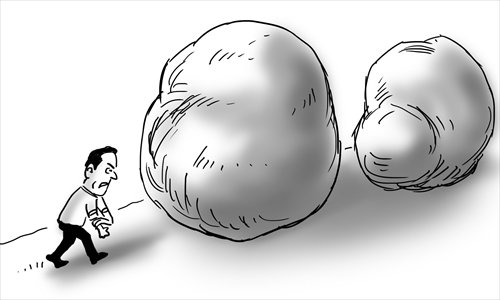Freeing prisoners shows Suu Kyi’s determination

Illustration: Liu Rui/GT
On Sunday last week, Myanmar's traditional New Year's Day, a pardon for 83 political prisoners signed by the new ruling party, the National League for Democracy (NLD), unveiled the government's determination to promote comprehensive national reconciliation in the coming year. Since the NLD government's term started on April 1, a total of 282 political prisoners have been freed. Aung San Suu Kyi, leader of the NLD, stated that her new government will work toward releasing all remaining political prisoners within the next fortnight.
This is only one of the major issues that the NLD has dealt with this month. Apart from forming a new government, the party has also adopted and announced three other important measures. To begin with, after Myanmar's President U Htin Kyaw signed the State Counselor Bill, Suu Kyi officially assumed the office as state adviser, a position that is higher than the president.
Both Htin Kyaw and Suu kyi highlighted the importance of amending Myanmar's constitution. Moreover, Suu Kyi vowed to strive for greater autonomy for the country's ethnic minorities.
Over the past two weeks, the NLD has emphasized its resolution to promote democratic construction within the country as well as Suu Kyi's wisdom in ruling the nation. However, it does not mean that the party's rule will be smooth in the future. A series of challenges that test the NLD's patience and wisdom are coming up.
The public's hunger for change was the key factor in the NLD's victory. It will also undoubtedly become the driving force as well as pressure for the party to put forward overall reforms in days to come. Therefore, in order to fulfill its promise to voters, the most urgent task for the NLD so far is to turn its long-term political ideals into concrete policies. Suu Kyi's statesmanship will be tested as she tries to promote the country's reform and opening-up, following the work of former president U Thein Sein.
Economically, the NLD's administration will need to explore innovative development, speed up the nation's economic growth as well as attract increasing foreign investment. The members of the new government led by the NLD are mostly intellectuals and members of the economic elite. Unlike the military officers in the country's previous administration, the current cabinet members know what Myanmar needs the most and what Myanmese people need the most.
Politically, the new government showed its determination to accelerate the construction of a truly democratic republic. But this requires a balance of interests among the NLD, the military, and ethnic minorities. The relationship between the NLD and Myanmar's previous ruling powers, the military and the Union Solidarity and Development Party (USDP), will be the most direct and significant factor in the country's future political development. The relations between the NLD and ethnic minority groups will also be a crucial element for the nation's national reconciliation.
After decades of junta rule, the interests of the junta as well as its representative, the USDP, are deeply rooted. Myanmar's future reforms will be bound to cross the red line of the group's interests. Therefore, negotiation and dialogue with the junta, as well as the possibility of reaching a compromise over interests, are very significant.
For the moment, clashes in northern Myanmar are still not under the new government's control. Although the NLD swept up seats in many ethnic areas during the elections, as long as the war continues, there will always be concerns about the central government among minorities. National reconciliation will be an important index of Myanmar's political development and the governing capability of the NLD.
When it comes to social issues, the current ruling party is also facing some puzzles. Since control over public opinion was gradually relaxed during Thein Sein's term, Myanmar's media has gone through unprecedented development, with a number of NGOs becoming active. The trend will be fiercer during NLD's term, and will provide a strong driving force for the society's further opening up. But negative nationalism and protectionism have also emerged, which is profoundly affecting Myanmar's national and social development.
On that score, the NLD will have to actively guide the nation's public opinion, and contain the rise of negative nationalism and protectionism, in order to create a warm and mild atmosphere for the country's development.
There are quite a few problems to be tackled down for the NLD. And that deserves patient observation from the outside world.
The author is a research fellow with the Charhar Institute and the College of ASEAN Studies at Guangxi University for Nationalities. opinion@globaltimes.com.cn Follow us on Twitter @GTopinion